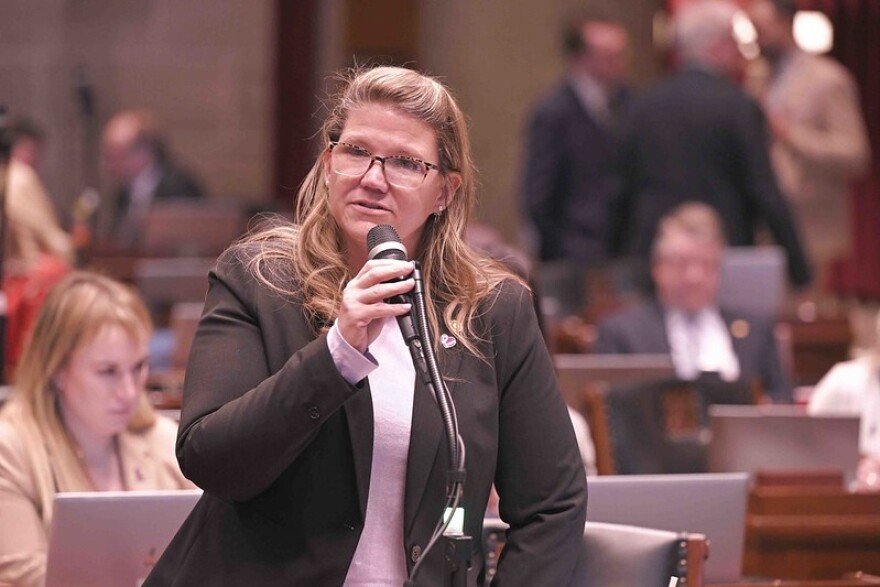The abuse that state Rep. Cecelie Williams survived from her former husband wasn’t physical at first.
“It didn’t start with him hitting me,” said the Republican from Dittmer, describing the ways he increasingly demanded and controlled her two decades ago. “Once I became a shell of the person I once was, the yelling started, then objects were thrown at me. A phone, a glass, a chair, a knife.”
One evening after grocery shopping with her three children, Williams came home and started fixing dinner. When she told her husband she forgot to get him beer from the store, Williams said he assaulted her with a baseball bat, breaking her jaw and fracturing her orbital bone.
Williams still remembers her young children’s “blood-soaked” footprints left on the floor around her as they tried to help her off the floor.
“Domestic abuse doesn’t always look the same,” she told her colleagues as she stood on the House floor earlier this year. “But three things remain constant: the fear, the isolation and the manipulation.”
By the time Williams initiated a divorce, she was told by the judge she could not finalize it because she was pregnant.
About six months after she gave birth, her husband died by suicide. It was 11 days before their divorce was set to be finalized and the day before he was supposed to go to prison. Williams said because they were still legally married, she was left responsible for his debts.
“No matter how deep the pain, the law kept me legally bound to him,” Williams said. “When you’re pregnant, the abuse doesn’t stop. It intensifies. Sadly this isn’t unique to my story.”
As lawmakers return to Jefferson City to kick off the back half of the legislative session, a House bill clarifying that a judge cannot prevent a divorce from being finalized just because a woman is pregnant is making its way through the Senate.
In Missouri, divorce cases can be initiated when a woman is pregnant, but if the woman is pregnant as the divorce is finalized, a judge may not conclude the case until a custody agreement is in place. It is one of five states with such roadblocks.
The legislation, sponsored by Williams and Raychel Proudie, a Democrat from Ferguson — who is also a domestic violence survivor — would add to state law an addendum stating “pregnancy status shall not prevent the court from entering a judgment of dissolution of marriage or legal separation.”
The law would still require that any women involved in divorce proceedings must state whether they are pregnant so custody and child support arrangements can be made.
“It’s not just a technical change,” Williams told her colleagues on the House floor last month. “It’s about safety, dignity and healing of women and children who have been subject to abuse. It’s about offering women like me the chance to escape not only the abuse, but the legal shackles that keep us trapped.”
On average, one in six women who experience abuse are first harmed during pregnancy, according to the March of Dimes. The American College of Obstetricians and Gynecologists recommends women be screened for signs of intimate partner violence during doctor’s visits since those experiencing abuse often see any violence escalate during pregnancy or postpartum.
Homicide is a leading cause of death during pregnancy and postpartum in the U.S.
Missouri isn’t an outlier in this. Homicide was the fourth most common cause of pregnancy-related deaths, according to a 2024 report by The Missouri Department of Health and Senior Services.
In speaking with other women in similar situations, Williams said abortion was at times a consideration.
Proudie said she has heard the same.
“That’s a hell of a situation to be in, no matter what side you’re on,” Proudie said. “Especially when you have to consider ‘I have other children to live for.’”

The legislation was first introduced in 2023 by current House Minority Leader Ashley Aune, a Democrat from Kansas City. The first year it was never heard in committee. She filed the bill again last year and it received a hearing but was never voted out.
“What struck me most were the men who reached out to me,” Aune told her colleagues on the House floor this year. “Men who, for example, were serving overseas while their family was back home and infidelity occurred. They returned from serving their country only to learn they couldn’t legally separate from their spouse due to her condition.”
She urged a unanimous yes vote, and the House delivered, sending the bill to the Senate on a 155 to 0 vote.
This story was originally published by the Missouri Independent.



